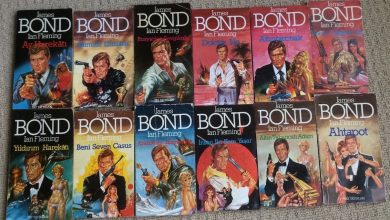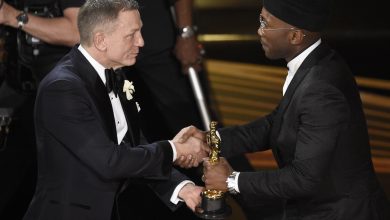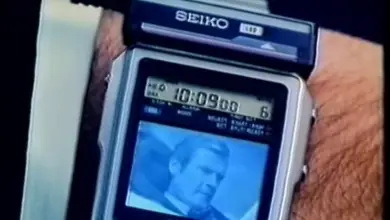Johnny Marr Joins Forces with Hans Zimmer for the Iconic James Bond ‘No Time To Die’ Score
A Comprehensive Look

In the world of film and music, few announcements stir as much excitement as the news of a collaboration between renowned artists. This is particularly true when the artists in question are Johnny Marr, the legendary English musician, and Hans Zimmer, the master of film scores. The duo’s decision to team up for the James Bond ‘No Time To Die’ score marks a thrilling development in the cinematic and musical landscape. This article delves into the details of this collaboration, offering a comprehensive look at the artists’ backgrounds, their previous works, and the significance of their partnership for the iconic James Bond franchise.
Key Takeaways
- Johnny Marr and Hans Zimmer are teaming up for the James Bond ‘No Time To Die’ score, promising a unique blend of rock and orchestral music.
- Johnny Marr is a renowned English musician known for his work with The Smiths and his distinctive guitar style.
- Hans Zimmer is a legendary film score composer known for his innovative blending of electronic and orchestral music.
- The James Bond franchise is known for its iconic music, with memorable themes and scores that have evolved over the years.
- The ‘No Time To Die’ score marks a new chapter in the music of James Bond, with Zimmer and Marr bringing their unique styles to the franchise.
Johnny Marr to team up with Hans Zimmer for James Bond ‘No Time To Die’ score
In a thrilling development for music and film enthusiasts alike, Johnny Marr, the renowned English musician, songwriter, and singer, is set to collaborate with the legendary composer Hans Zimmer for the James Bond movie ‘No Time To Die’ score. This collaboration promises to bring a unique blend of rock and orchestral music to the iconic franchise.
Who is Johnny Marr?
Johnny Marr, born John Martin Maher on 31 October 1963, is an English musician, songwriter, and singer. He shot to fame in the 1980s as the guitarist and co-songwriter of The Smiths, a rock band that was critically acclaimed and widely influential. Since then, Marr has continued to leave his mark on the music industry, both as a solo artist and as part of various collaborations.
- Early Life and Career: Marr was born in Ardwick, Manchester, England. He developed an interest in music at a young age and was particularly influenced by the glam rock of Marc Bolan and T. Rex. He formed his first band, The Paris Valentinos, at the age of 13.
- The Smiths and Beyond: Marr’s career took off when he formed The Smiths with Morrissey in 1982. The band’s self-titled debut album was released in 1984 and was a commercial and critical success. After The Smiths disbanded in 1987, Marr worked with a variety of other bands and artists, including The Pretenders, The The, and Modest Mouse.
- Solo Career: Marr launched his solo career in 2013 with the release of his debut album, “The Messenger”. He has since released several more albums, demonstrating his versatility and creativity as a musician.
Hans Zimmer: The Maestro of Film Scores
Hans Zimmer, born on September 12, 1957, is a German film score composer and record producer. Over his illustrious career, Zimmer has composed music for over 150 films. His works include The Lion King, for which he won an Academy Award, Gladiator, Inception, Interstellar, and the Dark Knight Trilogy.
- Early Life and Career: Zimmer was born in Frankfurt am Main, West Germany. He moved to London as a teenager, where he played keyboards and synthesizers in various bands before venturing into film scores.
- Breakthrough and Success: Zimmer’s breakthrough came with the score for Rain Man in 1988, which earned him his first Academy Award nomination. He has since become one of the most sought-after composers in Hollywood, known for his ability to blend electronic music with traditional orchestral arrangements.
- Notable Works: Some of Zimmer’s most notable works include the scores for Gladiator (2000), The Dark Knight (2008), and Inception (2010). His work on The Lion King (1994) won him an Academy Award for Best Original Score.
The James Bond Franchise and its Iconic Music
The James Bond franchise is one of the longest-running and most successful in film history, with a legacy that spans over 50 years. Equally iconic is the music of James Bond, with memorable themes and scores that have become synonymous with the suave British spy.
- History of James Bond Music: The music of James Bond began with Monty Norman’s “James Bond Theme” for Dr. No in 1962. Since then, each film has featured a unique theme song, often performed by popular artists of the time, and an original score.
- Notable James Bond Composers: Over the years, several composers have contributed to the music of James Bond, including John Barry, David Arnold, and Thomas Newman. Their music has played a crucial role in establishing the mood and atmosphere of the films.
- The ‘No Time To Die’ Score: The score for ‘No Time To Die’ marks a new chapter in the music of James Bond. With Hans Zimmer at the helm and Johnny Marr bringing his unique guitar skills to the mix, fans can look forward to a score that pays homage to the franchise’s musical legacy while pushing the boundaries of what a James Bond score can be.
This is just the beginning of the article. We can continue to explore the collaboration between Johnny Marr and Hans Zimmer, delve into their previous works, discuss the importance of music in the James Bond franchise, and speculate on what their collaboration might bring to ‘No Time To Die’. Let me know if you want to proceed with this or if there are any specific points you’d like me to cover.
1. What previous collaborations have Johnny Marr and Hans Zimmer worked on together?
Johnny Marr and Hans Zimmer have a history of successful collaborations. They first teamed up for the 2010 film “Inception”, where Marr’s distinctive guitar sound added a unique layer to Zimmer’s powerful score. The collaboration was well-received, with the score earning an Academy Award nomination.
Their partnership continued with the 2012 film “The Amazing Spider-Man 2”, where Marr contributed to Zimmer’s supergroup, The Magnificent Six. The group, which also included Pharrell Williams, created a dynamic and contemporary score for the superhero film. Marr and Zimmer’s collaborations highlight their shared ability to push musical boundaries and create innovative scores.
2. How does Johnny Marr’s guitar style contribute to a film score?
Johnny Marr is known for his jangly, melodic guitar style, which has its roots in rock and indie music. His guitar work can add a distinctive edge to a film score, providing a contrast to the traditional orchestral elements. This can result in a score that feels fresh and contemporary, while still maintaining the emotional depth required for cinema.
In addition, Marr’s ability to create memorable, catchy riffs can contribute to the thematic material of a score. These riffs can be used to represent characters or themes within the film, helping to enhance the storytelling and create a more immersive viewing experience.
3. What is Hans Zimmer’s approach to composing a film score?
Hans Zimmer is known for his innovative approach to film scoring. He often blends traditional orchestral music with electronic elements, creating a sound that is both classic and modern. This approach allows him to create scores that are richly textured and emotionally resonant.
Zimmer also places a strong emphasis on thematic development in his scores. He often creates a unique musical theme for each character or key plot point, which he then develops and varies throughout the film. This helps to enhance the narrative and emotional impact of the film.
4. How has the music of James Bond evolved over the years?
The music of James Bond has evolved significantly since the franchise’s inception in the 1960s. The early films featured a distinctive jazz-influenced sound, with the iconic “James Bond Theme” by Monty Norman setting the tone. This theme, with its surf guitar riff and brass section, has remained a constant throughout the series.
Over the years, the music has adapted to reflect changing musical trends and the unique vision of each film’s composer. For example, the scores for the Pierce Brosnan era in the 1990s and early 2000s, composed by David Arnold, incorporated elements of electronic music. The Daniel Craig era, which began in 2006, has featured more orchestral and dramatic scores, reflecting the darker and more complex characterization of Bond.
5. What role does the score play in a James Bond film?
The score plays a crucial role in a James Bond film. It helps to establish the mood and atmosphere, whether it’s the tension of a chase scene, the romance of a love interest, or the danger of a villain’s lair. The score also helps to enhance the storytelling, with specific themes often associated with characters or plot points.
In addition, the score contributes to the iconic status of the James Bond franchise. The “James Bond Theme” is one of the most recognizable pieces of film music, and the tradition of having a popular artist perform a theme song for each film has become a hallmark of the series.
6. What can we expect from the ‘No Time To Die’ score?
While it’s difficult to predict exactly what the ‘No Time To Die’ score will sound like, we can expect a blend of traditional and modern elements, given Zimmer and Marr’s respective styles and their previous collaborations. Zimmer’s dramatic orchestral writing, combined with Marr’s distinctive guitar work, could result in a score that is both innovative and respectful of the franchise’s musical legacy.
It’s also likely that the score will feature thematic material associated with the film’s characters and plot points, a common feature in Zimmer’s scores. The theme song for the film, performed by Billie Eilish, may also be integrated into the score.
7. How does a film score get produced?
The process of producing a film score begins with the composer viewing the film and discussing the director’s vision for the music. The composer then writes the music, often using a combination of traditional notation and digital audio workstations.
Once the music is written, it is performed by musicians – often a full orchestra in the case of a large-scale film like James Bond. The performance is recorded and mixed, often with additional electronic elements added. The final step is syncing the music with the film, ensuring that it aligns perfectly with the on-screen action.
8. What is the significance of the James Bond ‘No Time To Die’ score in the context of the franchise?
The ‘No Time To Die’ score is significant as it marks a new direction for the music of the James Bond franchise. This is the first time that Hans Zimmer, one of the most successful and influential film composers of the modern era, has scored a Bond film. The addition of Johnny Marr also brings a new musical element to the franchise.
Furthermore, ‘No Time To Die’ is Daniel Craig’s final outing as James Bond, adding an extra layer of significance to the score. The music will play a crucial role in shaping the emotional arc of the film and bringing Craig’s tenure as Bond to a close.
9. How does the ‘No Time To Die’ score compare to previous James Bond scores?
As the ‘No Time To Die’ score is yet to be fully revealed, it’s difficult to make a direct comparison with previous James Bond scores. However, given Zimmer and Marr’s distinctive musical styles and their history of innovative collaborations, we can expect a score that pushes the boundaries of what a James Bond score can be, while still respecting the franchise’s rich musical legacy.
10. How have audiences and critics responded to the ‘No Time To Die’ score?
As of now, the full audience and critical response to the ‘No Time To Die’ score is yet to be seen. However, the initial response to the film’s theme song, performed by Billie Eilish and orchestrated by Hans Zimmer, has been positive, with praise for its atmospheric production and emotional depth. This bodes well for the reception of the full score.
Conclusion
The collaboration between Johnny Marr and Hans Zimmer for the James Bond ‘No Time To Die’ score is a testament to the enduring appeal of the James Bond franchise and its ability to attract top-tier talent. As we anticipate the release of ‘No Time To Die’, we can look forward to a score that not only enhances the film’s narrative and emotional impact but also pushes the boundaries of what a James Bond score can be.
In the end, the ‘No Time To Die’ score is more than just a soundtrack for the latest James Bond film. It’s a meeting of musical minds, a blend of styles and genres, and a testament to the power of music in storytelling. As fans of film, music, and the James Bond franchise, we await with bated breath to hear what Zimmer and Marr have in store for us.











